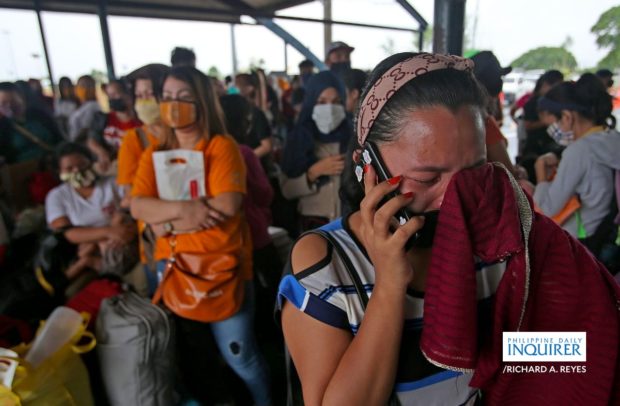SWS: Around 3.5M adult Filipinos got stranded in July due to quarantine

Stranded in Manila for months caused by enhanced community quarantine imposed to contain the coronavirus pandemic, Mary Ann Cayog from Davao Oriental cries as she talks to her mother over the phone while waiting for flight outside Ninoy Aquino International Airport Terminal 3 in Pasay City for more than 3 days on June 10, 2020. She has all the necessary requirements; barangay certificate, medical certificate, travel pass and plane ticket due on June 7 but the flight was cancelled. More than a hundred locally-stranded-individuals were held outside the terminal waiting to board flights bound for Mindanao particularly Davao and General Santos. INQUIRER file photo
MANILA, Philippines — An estimated 3.5 million adult Filipinos got stranded by community quarantine rules due to the coronavirus disease pandemic, according to the latest survey of the Social Weather Stations (SWS).
The survey conducted from July 3 to 6 found that 5.1 percent of adult Filipinos across the country were stranded due to several quarantine guidelines.
“This is an estimated 3.5 million stranded, based on the 2020 projected population of 69.5 million adults (18 years old and above),” SWS said in the survey results released Wednesday.
The SWS noted that the July figures were almost the same as the 5.4 percent or an estimated 4.1 million working-age persons (15 years old and above) stranded by the community quarantine in May. The poll body said the differences are not statistically significant between these two probability samples.
The proportion of those stranded in other places because of the community quarantine was highest at 8 percent or around 1.3 million individuals among those whose permanent homes are in Mindanao, followed by 5.9 percent or around 770,000 among those whose permanent homes are in the Visayas, 4.1 percent or around 1.3 million among those whose permanent homes are in Balance Luzon, and 2.1 percent or an estimated 200,000 among those whose permanent homes are in Metro Manila.
Article continues after this advertisementThe SWS said the July figures are not statistically different from the May data, when those stranded by community quarantine were 6.4 percent or around 1.1 million individuals among those whose permanent residences are in Mindanao, 5.3 percent or around 1.8 million among those whose permanent homes are in Balance Luzon, 5.0 percent or around 710,000 among those whose permanent homes are in the Visayas, and 4.8 percent or around 490,000 among those whose permanent homes are in Metro Manila.
Article continues after this advertisementThe survey was probability-based and conducted using mobile phone and computer-assisted telephone interviews of 1,555 adult Filipinos nationwide.
The respondents are composed of 306 in Metro Manila, 451 in Balance Luzon, or Luzon outside of Metro Manila, 388 in Visayas, and 410 in Mindanao, according to the poll body.
The poll had sampling error margins of ±2 percent for national percentages, ±6 percent for Metro Manila, ±5 percent for Balance Luzon, ±5 percent for Visayas, and ±5 percent for Mindanao.
JPV
For more news about the novel coronavirus click here.
What you need to know about Coronavirus.
For more information on COVID-19, call the DOH Hotline: (02) 86517800 local 1149/1150.
The Inquirer Foundation supports our healthcare frontliners and is still accepting cash donations to be deposited at Banco de Oro (BDO) current account #007960018860 or donate through PayMaya using this link.